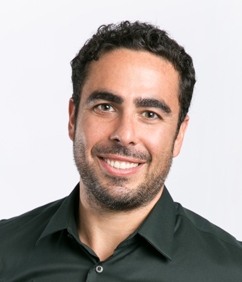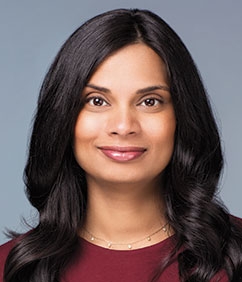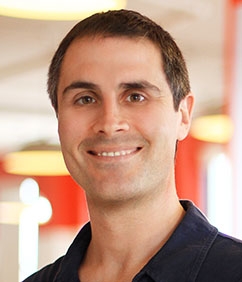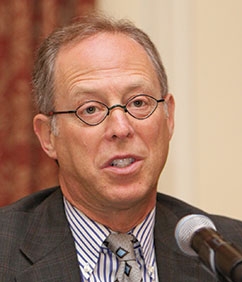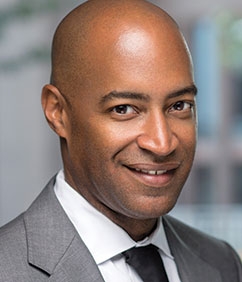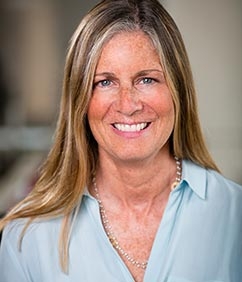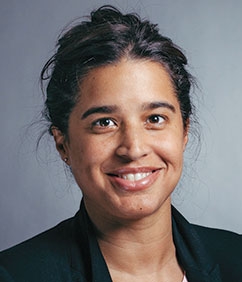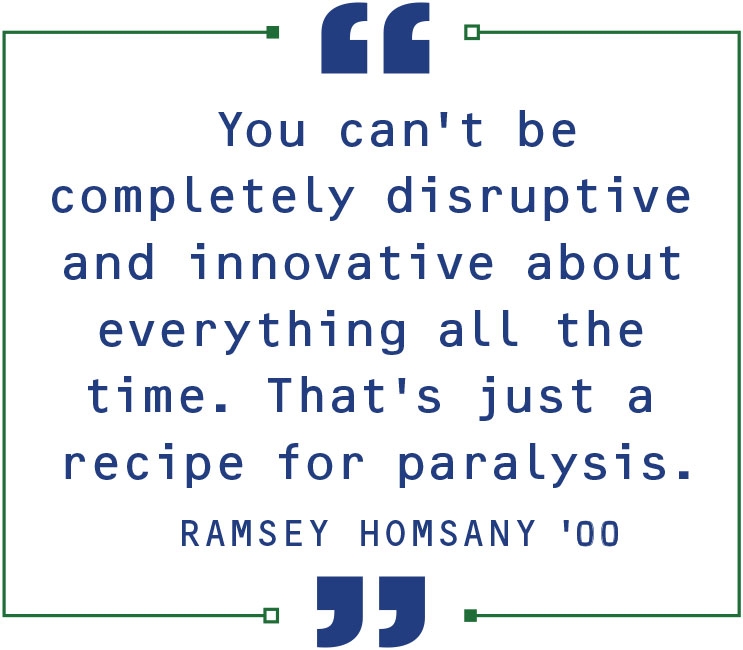Tech Heavies
NYU Law alumni lead the legal departments at some of the biggest corporate names in the technology sector.
BY ATTICUS GANNAWAY
The culture gap between the worlds of technology and law can be hard to bridge. Ramsey Homsany ’00 majored in biochemical engineering at Rutgers University; a class on ethics in engineering inspired him to pursue a legal education at NYU Law. The first time a professor mentioned circuit courts in one of his 1L courses, Homsany was thrilled.
He turned to a classmate and said, “Whoa, that’s really cool. The government’s more savvy than I thought. We have courts that do just electronics.”
As Homsany recalls it, “This person looked at me like, ‘What is wrong with you?’”
Fourteen years later, Homsany became general counsel of Dropbox, a cloud-based file hosting service that now grosses more than $1 billion a year and celebrated a red-hot initial public offering last March. He’s just one of a growing contingent of NYU Law graduates who’ve occupied the GC role at major companies in the technology sector, including Verizon, Twitter, and Reddit. For them, bridging the law-tech gap has led to careers helping to shape the strategy of fast-growing companies and navigating legal, regulatory, and ethical issues that didn’t even exist when they were studying for the bar.
None of the eight NYU Law graduates interviewed for this article set out to be the general counsel of a tech company. All of them began their careers at law firms, where, most say, learning the business side by working with corporate clients proved as valuable as establishing their legal chops. Three of the GCs—Homsany; David Pashman ’97, former GC of Meetup; and NYU Law Trustee Vijaya Gadde ’00, chief legal officer of Twitter—had early stints as associates at the same powerhouse Silicon Valley law firm, Wilson Sonsini Goodrich & Rosati, but most took a less direct route into the tech sector. Only some of these alumni harbored a longstanding interest in technology. Arguably more consequential were their adaptability and readiness to seize opportunities at the optimal time. And the mode of learning they encountered at NYU Law helped them synthesize knowledge more effectively in a sophisticated and swiftly evolving sector.
“Law school is a great time to explore and really think through the types of things that you might be interested in,” Gadde says. “Using that opportunity to take a number of different classes and not being only focused on one thing and not assuming that one thing is going to be a great fit is, I think, really valuable.”
Homsany, now co-founder of synthetic biology company Octant, found that NYU Law let him consider bigger-picture issues outside his technical education. “What I really enjoyed about law and technology was navigating these various intangible frameworks of what intellectual property really is,” says Homsany, quoting Thomas Jefferson: “He who receives an idea from me, receives instruction himself without lessening mine; as he who lights his taper at mine, receives light without darkening me.”
“It made me think that if what all these people are saying in magazines and the press is true,” Homsany adds, “which is that we’re entering this information age—and if information is so fundamentally different than property, in that it’s non-rivalrous—we’re going to have to rethink a lot of how our society works. And I just got very excited about that.”
Electronic Discovery
Other alumni who have led tech company legal departments echo Homsany’s description of NYU Law as having trained them to think differently about how to solve complex problems.
“The entire approach of law school I found incredibly helpful, because it teaches you how to think and analyze and process information in a very particular way,” says Pashman. The courses they consider most formative are eclectic, including Civil Procedure, taught by Norman Dorsen Professor of Civil Liberties Burt Neuborne; Capital Punishment Law and Litigation, taught by Professor of Clinical Law Bryan Stevenson; Corporations, taught by George T. Lowy Professor of Law Marcel Kahan; Current Constitutional Issues, taught by the late Professor Derrick Bell; Securities Regulation, taught by Professor Helen Scott; and European Union Law with Walter J. Derenberg Professor of Trade Regulation Eleanor Fox ’61.
But what about the technological preparation for the job? These GCs agree that tech fluency is a requirement for their positions. How they acquired it, however, varies widely.
NYU Law Life Trustee Randal Milch ’85 may be the quintessential example of on-the-job learning. In 1993, he made the leap from a partnership at a Washington, DC, law firm to an in-house position at the Chesapeake and Potomac Telephone Company of Maryland, a Bell Atlantic subsidiary. A regulatory lawyer with no telecommunications law background, Milch was hired to spearhead a crucial deregulation case in which a newly formed competitor sought the use of telephone lines and switches belonging to Bell Atlantic, which until then had had a monopoly on that infrastructure.
Milch says that he “litigated that first case and won it in the only way we could have won it, which was losing it in the right way.” The other company could use Bell Atlantic’s lines and switches, but it would have to pay a prohibitive price to do so. Within a year, Milch had been promoted to general counsel of the Maryland subsidiary.
The highly regulated telecom industry underwent a seismic shift with the passage of the Telecommunications Act of 1996, which kicked off both consolidation and litigation throughout the sector. With Bell Atlantic absorbed into a new entity, Verizon Communications, Milch worked as general counsel for two Verizon subsidiaries before becoming GC for the entire company in 2008. By then, the internet’s 1 percent share of all telecommunications information capacity had ballooned to 97 percent.
Milch, now retired from Verizon, credits his rise to lucky timing in terms of both deregulation and technological innovation, but he also points back to that first case in Maryland, which required him to understand how a telecommunications network functions. That crash course kickstarted “the process of learning the business in a different way and at a very deep level.”
By contrast, when Sophia Lee ’96—now general counsel of IEX Group—began practicing, she had a degree in mechanical engineering from the Massachusetts Institute of Technology. (Her undergraduate thesis involved creating a device to help paraplegics walk.) After working as a technology associate at Morgan Stanley and as deputy general counsel at Liquidnet, a global institutional dark pool trading network, she went to IEX, the parent company of the IEX stock exchange, in 2014.
IEX was newly famous as the subject of the New York Times bestseller Flash Boys: A Wall Street Revolt. IEX’s founders took aim at the controversial practice of high-frequency trading, building in a 350-microsecond “speed bump” to slow the velocity of trades and level the playing field for all investors. Lee spent two years guiding the company through the application process for approval of the new exchange by the US Securities and Exchange Commission (SEC). She had to know every detail backward and forward as IEX methodically addressed 500 public comments regarding the application.
It didn’t hurt that Lee had worked at the SEC her 1L summer as part of the Student Honors Program. But her tech experience was equally vital, she says. “It allows me to actively participate in technical discussions—like when we’re in the room with the SEC, diagramming out the technology and explaining how our speed bump works,” says Lee, adding, “I wouldn’t trade my engineering background.”
Homsany’s tech bent took him first to Wilson Sonsini and then to Google in 2003. Being willing to move back to New York, he says, helped him get his foot in the door; there, he built a legal team to support Google’s then-young advertising business. “Madison Avenue would not play ball,” he recalls. “They thought we were some stupid little computer company that didn’t understand advertising.” Less than a year later, though, ad agencies were calling him, “because their clients were beating them up for not having done Google deals,” he says.
After returning to California, Homsany ended up running Google’s entire commercial legal practice as a vice president and deputy general counsel, working on projects involving robotics and self-driving cars, before a Dropbox investor called. Homsany says he couldn’t resist the chance to be Dropbox’s first general counsel: “I’ve always just loved building things.”
Data Plans
Damien Atkins ’98, now general counsel of Panasonic Corporation of North America, was unusually methodical in mapping out the road to a GC position early on. At age 24, Atkins decided that studying law rather than business would broaden his career options, although he initially expected he would leave law school for investment banking before graduation. Instead, observing how many attorneys were going into i-banking—“It’s just this sixth sense I had, the more lawyers that go into banking, it’s a leading indicator of a recession”—he opted to be a corporate lawyer.
As an associate at Chadbourne & Parke working in mergers and acquisitions, capital markets, and securities law, Atkins found that he most enjoyed listening to inside counsel discussing their issues. Less than two years in, Atkins left to be assistant general counsel at govWorks, which was building a web portal for accessing local government services. The dot-com’s spectacular implosion was profiled in the documentary Startup.com (Atkins makes a brief cameo in one scene).
He returned to Chadbourne, then joined AOL in 2005. Starting as a junior M&A attorney, Atkins worked his way over the course of a decade up to senior vice president, deputy general counsel, and chief compliance officer. He says he paid rapt attention to the legal department’s structure and methodologies, and especially the different leadership styles of successive GCs. Eventually he began to interview for GC positions himself—without initial success. So Atkins made a close study of the most frequent questions and what they revealed about potential areas for improvement. “Very few people do their own internal gap analysis, and if they do, very few are really honest about it,” he says. After seeking out broader responsibilities, he landed the GC job at Japanese-owned Panasonic in 2015. Atkins credits Wilf Family Professor of Property Law Frank Upham’s Law and Society in Japan seminar with helping him acclimate.
At the opposite end of the plan-ahead spectrum is Maggie Drucker ’90, general counsel of Grubhub, the online and mobile food-ordering company whose brands include Seamless, Eat24, Allmenus, and MenuPages. “I sort of do things one step at a time,” says Drucker. “I don’t look ahead too much.” Drucker spent a year as a litigation associate at a New York firm, then clerked in the US District Court for the Eastern District of New York. Afterward, she went in-house first at publishing company Simon & Schuster, then at the New York Times Company in a part-time IP counsel position. “Having had the small taste of law firm life, I was very determined to find a kind of work-life balance,” she says.
When John Cuti ’90, then the GC of Martha Stewart Living Omnimedia (MSLO), invited Drucker to join his legal department, she moved further into the digital realm. In 2012, two former coworkers from MSLO recommended her to an investor in Seamless, an online food-ordering service that was seeking its first GC. A year after she became Seamless’s general counsel, the company merged with its chief competitor, Grubhub. The new entity went public in 2014.
“I’d never been through a merger like that,” Drucker says. “I’d never taken a company public. So in a very short time, I had all these incredible experiences which just made me grow… . Those first couple of years, every single day I was doing something new.”
It's Complicated
Leaders of in-house legal departments today wield exponentially more power than they once did, taking an ever-larger role in helping move the business forward, especially as their companies expand. Pashman notes that in his nearly eight years as the GC of Meetup, an online platform that allows people with common interests to organize offline groups, the job changed from “100 percent legal” issues to “99 percent” business strategy. (He now has a business role at parent company WeWork.) But as Ben Heineman Jr., the former GC of General Electric, argues in his book The Inside Counsel Revolution, today’s GCs must balance being a strategic partner to the business with acting as the corporation’s ethically conscious “guardian.” This tension is especially prominent in technology-oriented companies. The law has always struggled to keep pace with innovation, and the drive for commercial success in an industry that is constantly pushing boundaries makes the job of a tech firm GC particularly complex.
Back in 1993, when Milch was battling over telephone lines and switches, he never foresaw that, two decades later, a government contractor named Edward Snowden would leak secret National Security Agency (NSA) documents revealing that the NSA had compelled Verizon to supply data on millions of its customers. Milch, who had taken the lead on Verizon’s cybersecurity initiatives to prevent hacking of customer data, found himself dealing with the worldwide fallout from the Snowden scandal; Verizon adopted an industry-leading policy of transparency about government requests for company data.
At the top of the agenda these days for Reddit GC Melissa Tidwell ’03 is handling the scrutiny Reddit faces over Russian interference in the 2016 US election. A website for news aggregation and discussion of every topic imaginable, Reddit has a reputation for being the home of outspoken contributors operating at the outer limits of acceptable speech. Some, it turns out, have been Russian trolls. In April, Reddit, whose leaders once espoused an absolutist free-speech policy, announced it had banned nearly 1,000 accounts emanating from a Russian troll farm that had been indicted in the course of Robert Mueller’s special counsel investigation into Russian interference.
The troll problem, Tidwell says, “certainly created a lot of work for us to do.” It is closely linked to the broader issue of cyberbullying. Ensuring the company fully appreciated the scope of the problem was “the biggest challenge for us in terms of making progress,” she notes. Since she joined Reddit, the company has separated the once-combined functions of community management and trust and safety. Their two-pronged approach, Tidwell explains, involves not only shutting down incorrigibly toxic “subreddit” communities but also ensuring that compliant users elsewhere can post “without someone directly coming to attack them.”
At Twitter, Vijaya Gadde has operated under an even brighter spotlight when it comes to election-related investigations. Upholding Twitter’s free-speech ideals for hundreds of millions of tweets per day while also preventing users from flaming one another is no easy task. “Part of the challenge for us,” says Gadde, “is to be able to operationalize the enforcement of our policies at scale and also be understanding of the cultural context and nuances in our policies and their enforcement… . All these product choices that we’ve made, which are really fundamental to what Twitter is and how it works in the world, have also allowed it to be abused.” Close partnering with her product and engineering counterparts, she says, is essential.
Gadde also recalls some advice from her predecessor as GC at Twitter, Alexander Macgillivray: to befriend other tech GCs, who know what it’s like to hold “a very lonely job… . The role itself is one where you don’t have a lot of people [with whom] you can share the challenges of what you’re going through.” Tidwell says she draws support in particular from other female general counsel: “There are relationships and connections in order to make sure that we’re all successful, because these are ultimately extraordinarily difficult roles.” Drucker belongs to a longstanding listserv for woman GCs; she suggests that women are often more willing than men to seek advice when they don’t know something.
The path to a tech firm GC role is more defined today than it was when these eight alumni graduated from the Law School. NYU Law has created much closer links between the law and business disciplines. Dean Trevor Morrison co-teaches a seminar, Lawyers as Leaders: The Corporate General Counsel, and a related externship. In the technology arena, Milch, a professor of practice at the Law School, has co-taught the Cybersecurity Law and Technology Seminar since 2016 and is also a faculty director of the Master of Science in Cybersecurity Risk and Strategy program, a joint venture of the Law School and NYU’s Tandon School of Engineering. Additionally, Milch serves as co-chair of the NYU Center for Cybersecurity, another cooperative initiative between the two schools. For the past five years, Pashman has taught a seminar, now called The Law of the Startup. There are also classes on global tech law, information privacy law, and internet contracts, as well as the Technology Law and Policy Clinic.
But as useful as this expanded curriculum might be for future tech GCs, today’s GCs say that a human element difficult to capture in a classroom matters as well. “That was probably the biggest learning curve for me: how to effectively manage a large team and at the same time focus on the substantive work,” says Gadde. “I have a department I’m responsible for, and making sure that people feel inspired, that they’re happy in their roles, that they are growing and learning—all that stuff required a lot of learning on my own and a lot of focus and attention from me day to day.”
Atkins stresses the need to acclimate to tech corporate culture, warning against “three-swipe emails” that require recipients to scroll down on their phone screens: “Speed is much more important, accuracy is always critical, and brevity is the highest virtue.”
The truth is that, in a fast-changing industry always on the cusp of another breakthrough, no lawyer is completely ready for everything a tech GC faces. But a flexible mindset combined with a solid foundation in legal analysis and business strategy separates sinkers from swimmers. “You can’t be completely disruptive and innovative about everything all the time,” says former Dropbox GC Homsany. “That’s just a recipe for paralysis, because you’re trying to rethink everything you’re doing at all moments. You can’t make progress. Part of what being a GC is about is really understanding the direction of the company—what’s important to the company, what’s important to its stakeholders—and prioritizing how to address those things.”
Illustrations by Dan Bejar
Posted September 4, 2018


